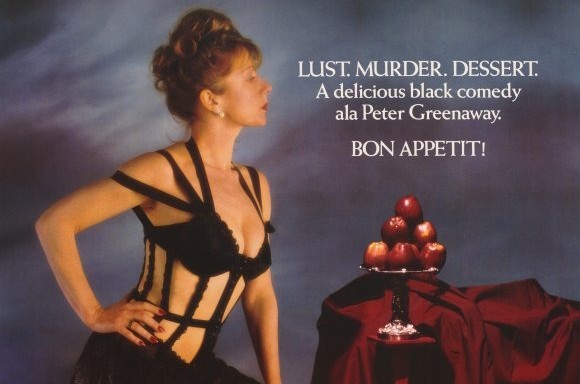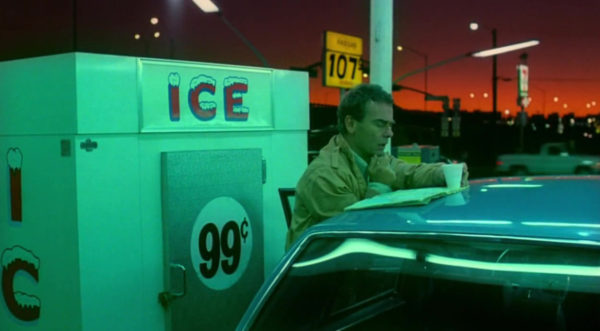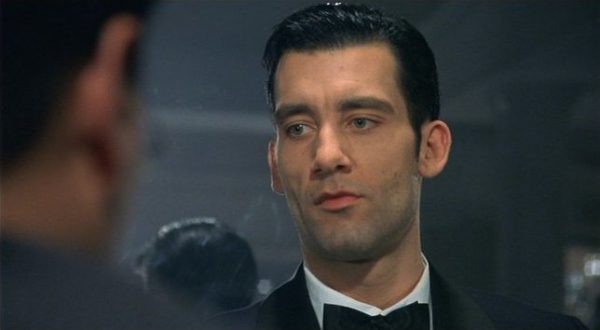Tom Jolliffe with ten essential films from Film4…
Film4, under the Channel 4 banner, has championed great cinema for nearly 40 years. Whether producing independently or co-producing (often with indie studios or European production houses), there’s a stamp of quality that comes associated with the mark of Film4 (or Channel 4 films).
For the most part, these films often have unique quirks that separate them from much of the mainstream alternatives of any given year. A look back through the catalogue is eye-catching and as a purveyor of cinema, Film4’s record is imperious. They’ve helped put good cinema out into the ether, but also great cinema and even uniquely special cinema.
Here are some essential Film4 (Channel 4) films:…
The Cook, The Thief, His Wife and Her Lover
Calling something Peter Greenaway’s most accessible film is probably like calling a property West London’s least expensive townhouse. Still, it really is one of his easiest to give yourself over to. Greenaway, an artist turned director, whose films almost always challenge narrative convention and push the boundaries of censorship, has a long connection with Film4.
The Cook, The Thief, His Wife and Her Lover sees Michael Gambon in barnstorming form as one of cinema’s most grotesque characters. Helen Mirren electrifies as his downtrodden wife. It’s glorious to look at, the soundtrack is fantastic and it doesn’t hold back on either sex or graphic violence. All told though, it’s a film that you cannot look away from and it’s a true work of art, even if you may find it difficult to watch.
SEE ALSO: The Cook, The Thief, His Wife, and Her Lover: Anti-Cinema and Anti-Thatcher Allegory
Trainspotting
Like Greenaway, Film4 has proven a welcome home for Danny Boyle. He’d already had a breakout with the superb (and also essential) Shallow Grave. He’d also have plenty of future essential entries like Slumdog Millionaire, but Boyle’s masterpiece and real dazzler still remains the unforgettable Trainspotting.
It’s a visceral, non-stop, gut-wrenching work of near incomparable visual flair. Ewan McGregor makes a character who shouldn’t evoke much sympathy, thoroughly sympathetic, but likewise impossibly charming too. He’s magnetic. Scenes still shock and revile to this day but the film is also gripping and gruesomely funny.
The Full Monty
Trainspotting alumni Robert Carlyle showed his versatility brilliantly in a little run of great British films. Alongside Trainspotting there was the underrated and stylish gangster film Face (from the BBC, and overshadowed by Lock, Stock and Two Smoking Barrels the following year) all coming from the back of TV fame with Hamish Macbeth. Then he flipped things up even more, with The Full Monty.
Light-hearted, melancholic, warming, and hilarious, The Full Monty came out of the blue to an extent but was an instant smash on every level and then became the bar by which every other similarly light-hearted dramedy would be measured. Carlyle is superb, as is the fine supporting cast of recognisable British greats. I could watch The Full Monty once a week for the rest of my days and not tire of it.
Paris, Texas
Paris, Texas is a prime example of amalgamating several elements to create something truly unique. It’s got shades of a Western, American road movie, but with the Euro sensibility of its director, Wim Wenders. This combined with the beautifully poetic writing of Sam Shepard (based on his play) and L.M Kit Carson (whose son features as the young child in the film), which feels distinctly American melancholia, makes Paris, Texas one of a kind.
Further, you get someone as grizzled and emotionally complex as Harry Dean Stanton, the poster boy for fifth-billed character actors, who is given center stage. He snatches the opportunity with both hands. Stanton doesn’t even speak for the opening 20 minutes and doesn’t say much throughout (until its infamous final act monologue).
Everything about Paris, Texas feels ethereal but also crushingly real, hauntingly soulful. Robby Muller shoots it in a way no one else could possibly ever hope to match, and Ry Cooder’s slide guitar score feels like it erupts out of dust and swirls through the picture and out again, before the next burst. It’s perfect cinema.
Naked
Unique you say? How about Mike Leigh’s Naked? He’s one of the grand purveyors of Kitchen sink cinema, probably second only to Ken Loach, but Leigh’s gritty depictions of working-class life have often found a willing home at Channel 4. Naked is different though. It has all of that, but it’s also a near metaphorical odyssey through the back corners of London.
An unlikeable but fascinating protagonist (David Thewlis) is unshakably enthralling, and he encounters outsiders and the cast asunder throughout his insomnia-plagued jaunts in the dead of night. It’s all shot with ethereal allure by Dick Pope. It’s Leigh’s most visually resplendent film that brings London close to a fantasy world. David Thewlis gives a performance for the ages.
Under The Skin
Art-house sci-fi horror with a plot that bears a striking resemblance to Species (the mid 90’s slice of schlock with Natasha Henstridge), Under The Skin seemed a world away from director Jonathan Glazer’s previous Film4 classic Sexy Beast (also utterly essential). Scarlett Johansson is an alluring, but existentially curious space siren lulling men into a black widow (see what I did there) lair. Sex to die for. The more she encounters and observes human behaviour (in Glasgow), the more curious she becomes, slowly beginning to develop an understanding (if not quite feeling) of empathy.
Under the Skin is strange, unnerving and strikingly bleak in its photography of Scotland’s urban and rural settings. Johansson is sensational, with many of the film’s participants real people (covertly filmed). Johansson’s improvisational abilities, combined with total immersion in the role she’s playing, is by far the most mesmerising thing she’s ever done. The soundtrack by Mica Levi is atmospheric and spine-tingling in equal measure.
In Bruges
Martin McDonagh’s razor-wry script and the (fucking) fairytale Bruges settings lay the foundations for this dark, gripping and hilarious hitman buddy film. Colin Farrell and Brendan Gleeson are a great double act, whilst Ralph Fiennes blusters into the film like some kind of scenery-chewing hurricane.
In Bruges is black comedy at its finest. The prospect of McDonagh, Gleeson and Farrell re-teaming for the upcoming Banshees of Inisherin is very exciting. Adding to the atmospheric Bruges backdrop is Carter Burwell’s enveloping score.
The Father
More recently in the Film4 arsenal we have The Father. It’s a seamless and evocative blend of drama, thriller and psychological horror, with Anthony Hopkins as an elderly father slowly losing a battle against dementia. Hopkins is painfully, hauntingly good and among the tense moments of horror (horrific because they feel so genuine), it’s ultimately that central tale of a man unable to maintain control of his mind that is tragic and heartbreaking.
There were some who questioned whether Hopkins’ Oscar was simply a result of his legacy and age. The reality is, Hopkins’ performance was by a long way, the best performance of the year and one of the finest of the last 10. Absolutely exceptional. Very few actors remain this good, this powerful, into their 80s. Alongside Hopkins, Olivia Colman would once again prove just how exceptional she is too.
This Is England
Shane Meadows has had a great affinity with Channel 4 over the years, with not just his films but his miniseries as well. Dead Man Shoes was a stunning and ragged low-budget film, with an electrifying performance from Paddy Considine. Step forward a few years and Meadows would iron out a few creases and create a work that perfectly encapsulated a time and place.
This Is England was both lovingly nostalgic, and thunderously blunt on the darker factions that took over Skinhead culture. The tale of a fatherless boy (his dad dying in the Falklands) being taken under the wing of a band of rambunctious skinheads turns a corner when he’s then assimilated into a nationalist group of skinheads. Sean (Thomas Turgoose who is superb), finds a new father figure in Combo (Stephen Graham).
The film’s turn from lighthearted follies of youth making the best of it in downtrodden Northern areas, annihilated by Thatcher, to its pitch-dark finale is enthralling. Stephen Graham’s performance, which is layered and complex rather than painted as irredeemably bad, is what makes the film so powerful. Graham’s persuasion and manipulation are clear, but he also wears the cyclical nature of radicalism on his sleeves. Combo was once Sean and it’s all too patently clear. He’s terrifying and heartbreaking, personified in a sequence that crushes the viewer every time.
Croupier
From Mike Hodges, the director of Get Carter, comes another atmospheric crime tale of corrupt but intriguing characters. It might not be Get Carter levels of brilliance (what is?) but it’s a cool and engaging film which launched Clive Owen to the forefront of British cinema, and not long after he’d broken Hollywood.
Croupier’s inclusion of a narration could have been clunky, but never forces exposition, maintaining a glimpse into the character’s inner wit. Owen is great, the sultry Alex Kingston is also superb. In the post-Tarantino era, crime films had a fascination with twisty turn plots, red herrings and double bluffs. It’s all here in Croupier but with its own uniquely cool spin.
What is your favourite Film4 (Channel 4) film? Let us know on our social channels @FlickeringMyth…
Tom Jolliffe is an award winning screenwriter and passionate cinephile. He has a number of films out on DVD/VOD around the world and several releases due out in 2022, including, Renegades (Lee Majors, Danny Trejo, Michael Pare, Tiny Lister, Nick Moran, Patsy Kensit, Ian Ogilvy and Billy Murray), Crackdown, When Darkness Falls and War of The Worlds: The Attack (Vincent Regan). Find more info at the best personal site you’ll ever see here.






















